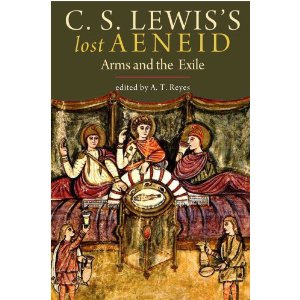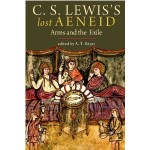
Hey, everybody! Welcome back to Tumnus’s Bookshelf where we review any and all books by, about and inspired by CS Lewis and the land of Narnia. For today’s review we will be looking at CS Lewis’s Lost Aeneid: Arms and the Exile, translated by CS Lewis and edited by AT Reyes. 
Title: CS Lewis’s Lost Aeneid: Arms and the Exile
Author: CS Lewis
Editor: AT Reyes.
Publisher: Yale University Press; Bilingual edition (May 3, 2011)
ISBN-10: 9780300167177
ISBN-13: 978-0300167177
Summary:
Get ready to experience Virgil’s epic poem The Aeneid in a whole new way, as translated by CS Lewis. Following the destruction of the city of Troy after the end of the Trojan War, a young man named Aeneas ( spelt Eneas in this text) embarks on a quest with a band of refugees, guided by the goddess Venus. Eneas’ journey takes him from the ruins of Troy to the depths of the underworld, to the land of Carthage, to battles with harpies and other mythical monsters, and finally to the shores of a land that will one day be home to the city of Rome.
Review:
It has often been said by fans of CS Lewis that his greatest work of fiction was his final novel, Till We Have Faces. While that is true, a brand new, posthumously published work has resurfaced that would have put even Till We Have Faces to shame. The book is called, CS Lewis’s Lost Aeneid: Arms and the Exile. It is simply, a master writer’s brilliant attempt at translating not only one of the world’s greatest epics, but one of his favorite books.
In Lewis’ hands the Virgil’s masterpiece has never felt more alive. No longer does the tale feel stuffy, dry or boring, but bold, heroic and exciting. Lewis does not interject his own Christian beliefs into the text, but he does draw out the Presence of divinity (albeit pagan divinity) that most translators choose to ignore. Some may be surprised at the idea of a “translation” of a Latin text by CS Lewis, but let us remember that he lived and wrote in a time where kids were still taught to read, write and speak Latin in school. As such it was a project he wished to undertake, for both academic (parts of it were done as school assignments) and personal reasons (he felt other translations were lacking.)
Editor AT Reyes did more then just compile the fragments from all the journals and workbooks, he dove through letters and journals by CS Lewis as well as the letters of individuals like JRR Tolkien. The key of writing a good research paper is to show your work and cite sources, and Reyes shows the great depth of research he did to complete this lost work and to prove that this is in fact a legitimate CS Lewis text. He also provides photo-copies in the book of the original manuscript paper as written by CS Lewis.
However this work is largely unfinished as CS Lewis had other maters to tend to during his life and was never able to complete this work. AT Reyes supplies the readers with summaries of the missing chapters or “Books” (as ancient works like The Epic of Gilgamesh, The Iliad, , The Odyssey, or The Aeneid, were not divided into “Chapters” but “books”) so readers can know the full story. He also pairs the translation with the original Latin text, as compiled by William Morris, Lewis’ “favorite” version of the text (even Greek and Latin texts can have different versions in their original language). By the end of the book, one way or another, you know the full story. That was something stated in the preface that CS Lewis would have considered most important: not the translation or the translator but being able to read, appreciate and understand the work itself.
Readers just discovering Virgil are sure to find CS Lewis’s Lost Aeneid as a most excellent gateway into this classic work. Older readers will find new love and enjoyment in one of the world’s finest adventure stories. This book deserves a place on the book shelf of any lover of great literature, and not just CS Lewis or Narnia fans.
Order the Book From Amazon.com
4 ½ out of 5 sheilds

cool.
first to comment!
what a great idea! To simplify and translate a classic epic into a readable style to give newcomers(like me)an opportunity to delve into the lives of antiquity.
Niiice! I never knew C.S. Lewis even did stuff like this. I guess he was a more diverse author than I thought. 🙂
yep, he was a Professor of Medieval and Renaissance English at the university of Cambridge, among other things.
Hmmm, wow! I guess he WAS really diverse. 🙂
Interesting…sounds like he knew Greek Mythology pretty well.
He did. Actually all seven Narnia books are filled with not just scriptural allusions, but references to Greco-Roman mythology.
I love to study anceint greece and rome!! I also like the middle ages; thats probably just one of the reason’s i like narnia……..
All I have to say is,
God Bless C.S. Lewis! 😀